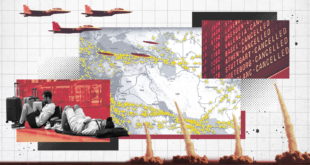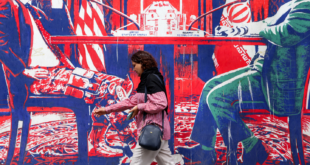For Hezbollah, the terrorist army that occupies southern and central Lebanon and maintains and arsenal of 150,000 missiles aimed at Israel, the explosion is a mixed blessing.
A wedding photographer was flying a drone in Beirut on Tuesday. As the drone maneuvered over the head of the bride and then circled next to her dress, a massive explosion kilometers away caused a burst of air that sent dust gusting into the frame and caused the bride to run for cover. The camera crew and the bride were the lucky ones. Across Beirut at least 137 were killed, thousands were injured, and the city was laid waste.
Prime Minister Hassan Diab declared three days of mourning from Thursday as early investigations blamed negligence for the explosion at Beirut port.
Up to a quarter of a million people were left without homes fit to live in, officials said, after shock waves smashed building facades, sucked furniture out into streets and shattered windows miles inland. The death toll was expected to rise from the blast, which officials blamed on a huge stockpile of highly explosive material stored for years in unsafe conditions at the port.
The explosion was the most powerful ever in Beirut, a city still scarred by a civil war that ended three decades ago and reeling from an economic meltdown and a surge in coronavirus infections.
“No words can describe the horror that has hit Beirut last night, turning it into a disaster-stricken city,” President Michel Aoun said in an address to the nation during an emergency cabinet session.
IT HAD already been a tough week for Lebanon. In the throes of a financial crisis widely seen as the biggest threat to its stability since the 1975-90 civil war, and with hard currency growing ever scarcer, the Lebanese pound has lost some 80% of its value, depositors have been shut out of their savings, and unemployment and poverty are soaring. A report at the Foundation for Defense of Democracies revealed that it will take $93 billion to rescue Lebanon from its enormous debt.
A UN investigation, 15 years in the making, was supposed to finally release details on who murdered Lebanese prime minister Rafik Hariri in 2005. He, too, was incinerated by a massive bomb blast. The Special Tribunal for Lebanon, a UN-backed court located outside The Hague, Netherlands, decided to delay its verdict “out of respect for the countless victims of the devastating explosion.”
The country had been bracing for the verdict in the case of the men charged with planning and arranging the bombing 15 years ago. The four defendants, who are not in custody and are being tried in absentia, are linked to Hezbollah.
For Hezbollah, the terrorist army that occupies southern and central Lebanon and maintains and arsenal of 150,000 missiles aimed at Israel, the explosion is a mixed blessing. It could capitalize on the ruination brought to the more liberal parts of Beirut by sinking its fangs into reconstruction efforts.
It has done this in the past. Hezbollah and its leader, Hassan Nasrallah, are masters at turning crisis to opportunity. For instance, after the murder of Hariri, Hezbollah appeared to lose out on its Syrian regime ally. The Syrians, occupiers of Lebanon since the 1970s, had helped midwife Hezbollah to run part of the country. But the murder of Hariri was widely blamed on a nefarious alliance of Damascus and Hezbollah. Protests caused the Syrians to leave. Hezbollah lay low initially.
But Hezbollah is always plotting. A year and a half after Hariri was killed, Hezbollah launched an attack on Israel. The goal here was for Hezbollah to showcase its abilities. Hezbollah claims to be “defending” Lebanon from Israel. Israel withdrew from Lebanon in 2000, potentially ending the raison d’être of the terrorist group. It wasn’t “resisting” anymore. But for jihadist groups, whether Sunni or Shi’ite like Hezbollah, “resistance” always takes the form of aggression, terrorism, ethnic cleansing and swallowing up countries. Therefore, Hezbollah attacked Israel in 2006, and a vicious, destructive war resulted.
But Hezbollah always finds a way to win, even if it loses. In 2008 it occupied Beirut after clashes with rival political parties, showing its muscle. The government, with support from Rafik’s son Saad Hariri, had challenged Hezbollah’s use of an independent telecommunication network. Hezbollah had likely used this network to plot the murder of Rafik Hariri. Hezbollah responded with force.
After the 2006 war and 2008 clashes, it sponged up investment in Lebanon, including likely leveraging Qatari and other investment to its own ends. It built up a shadow economy so as to route money to drug trafficking in South America and through corrupt banks linked to Iran. It gained a new opportunity with the Syrian civil war. In 2012 it began to send hundreds of fighters to Syria and basically took over Lebanon’s foreign and military policy. Hezbollah hijacked the parliament and presidency, refusing to name a successor to the Christian president Michel Suleiman. Not until 2016 did Hezbollah get what it wanted, when its ally Michel Aoun was appointed president.
By 2016 Hezbollah was entrenched in Syria, and it had mobilized itself to receive new precision-guided munitions from Iran. It benefited from the Iran deal and likely benefited from the Gulf crisis that pitted Qatar against Saudi Arabia and the UAE. Saudi Arabia, a guarantor of the peace process that ended the civil war in Lebanon in 1989, tried to pressure Lebanon by appearing to pressure Saad Hariri during a trip to Riyadh. But nothing worked to sideline Hezbollah. It always seems to grow and grow, even if it suffers setbacks like having key members killed in Syria.
THIS WEEK, the massive explosion represents another possibility for Hezbollah. While it may initially get some criticism and heat for the explosion, because it also maintains dangerous stockpiles of weapons all over Lebanon, it will find a way to leverage this to its benefit. Hezbollah wants China, Russia and Iran to help rebuild Lebanon. Turkey and Qatar are also rebuilding the country, but Hezbollah has amicable relations with Doha.
Now Hezbollah may have to wait some time before making its moves clear. This is because it can’t raise its head too much and appear to gloat over the destruction. It will instead try to send volunteers to help and portray itself as the responsible party. It will try to shift blame to Israel and the US. While others are distracted with solidarity for Beirut, Hezbollah will increase its stranglehold elsewhere. This has always been the Hezbollah model. It may increase trafficking in weapons from Syria and construct new bases.
Israel would be reticent to carry out any actions in Lebanon amid tensions with Hezbollah, because Israel will not want to be seen as harming Lebanon more. This means the explosion becomes a perfect smokescreen and solidarity shield for Hezbollah. For average Lebanese, it is yet another disaster in a long series of disasters.
While Hezbollah will pretend to be patriotic, it will work behind the scenes to corrupt everything that comes into Lebanon in the next year.
 Eurasia Press & News
Eurasia Press & News


